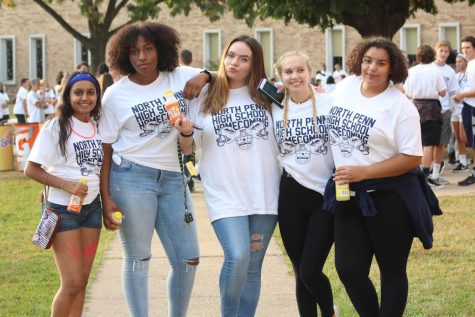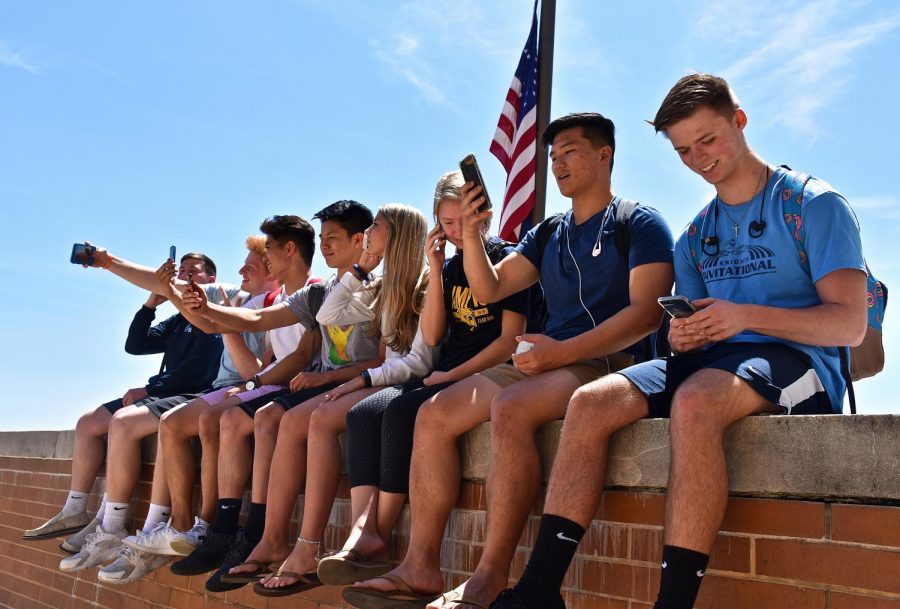Y2K to Today: The Kids Who Watched the World Change
From 2000 to 2018, the world evolved in drastic measures, and the Class of 2018 were the kids who watched it happen.
Eighteen years ago, when the Class of 2018 was born, there were no #deliveryroomselfies. There were no Facebook status updates about a baby’s first steps or tweets about what time he or she finally got to sleep at night (or morning). Oh, and there was no viral video about the gender reveal or diapers that could be delivered to your door either
However, eighteen years later, those things are a reality, and the babies of the new millennium are graduating high school.
While the world was anticipating the Y2K bug, the Class of 2018 was being born. Growing up as the first children to enter kindergarten in the new millennium, the 2000 babies were born into a world that was on a fast track of invention, innovation, and change. From 2000 to 2018, the world evolved in drastic measures, and the Class of 2018 were the kids who watched it happen.
The Class of 2018 was one of the last waves of students to be born before the September 11th, 2001 terrorist attack on the United States. The Y2K babies do not remember 9/11, but they have grown up with the effects of the tragic moment in our world’s history, one that changed the way our nation handles National Security and largely how we view the world and go about a lot of our daily business. The Class of 2018 has never known an airport without the Transportation Security Administration (TSA), the banning of liquids through security, explosive detection systems, and full body scanners.
Besides growing up under stricter security, Y2K babies also grew up with social media as we know it.
- 2004 – Facebook
- 2005 – Youtube
- 2006 – Twitter
- 2010 – Instagram
- 2011 – Snapchat
Social media networks encourage people to stay connected and have immensely impacted the way we communicate on a day to day basis. The Y2K babies were seven years old when the Apple iPhone was first released in 2007. Cell phones were no longer just for making calls and sending text messages, but they were now home to hundreds of applications, photos, videos, and well… lots of other things. Apps have slowly made the cell phone a necessary tool for everyday functioning for much of this generation of graduates.
“The biggest change that happened for people was when social media combined with the cell phone. Everybody’s heads were in it. Today, most people will be beside themselves if they leave their phone at home,” said North Penn SD Coordinator of Communications Media Robert Gillmer, who started working in the NPSD in 1993.
While everyone was affected by the emergence social media and smartphones, it was an integral aspect of a Y2K baby’s childhood, and no other generation of people have had to deal with that before. Having social media accounts at a young age also invited a new culture where for the first time, gaining “likes” and having “friends” or “followers” was a desired quality to have.
“If I have a Twitter account with four followers, what does that mean? Does no one like me? I can’t even compare that to something in my childhood – maybe the number of Valentine’s Day cards I got in fourth grade. That’s a whole different dynamic,” said Gillmer.
Having an early attachment to social media accounts could be problematic according to North Penn senior Reid Dentner who believes they may contribute to kids being overly focused on themselves.
“I believe our generation is suffering from a vanity problem more severe than the past. There are more ways than ever to gain attention, many of which don’t seem healthy or productive. The Class of 2018 has been groomed to share more than listen, and unchecked, I think this can become an issue,” said Dentner.
Unlike any generation before them, Y2K babies reap the benefits and consequences of their favorite social media applications during their adolescent years. One consequence specifically is the fact that content they post online stays there forever, and it has the possibility of negatively impacting their lives.

North Penn students pose for a photo during the 2018 Homecoming picnic.
“We all have done really dumb things or said really dumb things, but there is no documentation of it. I guarantee everyone born before 2000 has said dumb things that they would be completely embarrassed by if people knew they said that today. But it doesn’t exist anywhere. We had the benefit of being somewhat anonymous in our lack of thought about what we were doing. Our mistakes do not exist in hard evidence like they do today,” explained Gillmer.
Another phenomenon that appeared as the Y2K babies were growing up was the rise of reality television shows and entertainment television.
- 2000 – Survivor (CBS)
- 2000 – Big Brother (CBS)
- 2001 – The Amazing Race (CBS)
- 2002 – The Bachelor (ABC)
- 2002 – American Idol (ABC)
- 2007 – Keeping Up With the Kardashians (E!)
Many more televisions shows that made their debut in the 2000s still air today. Interest in reality television says a lot about society’s culture and what people care about, and the Y2K babies were one of the first generations to grow up in that kind of entertainment atmosphere.
“None of those shows are good without conflict. But that’s reality television, and I feel like that has permeated how people behave in general in society. It isn’t ‘hey, I see that side of your story,’ it’s ‘no, you’re still wrong, and I’m going to tell you why I’m right’. It’s affecting all of society, everyone wants to be mad. No one knows what that means for the generation who grew up with it,” noted Gillmer.
Not only did the Class of 2018 grow up with the evolution of entertainment, but they also grew up with the evolution of companies such as Amazon and Uber. Amazon, an online bookstore created just a few years before the Y2K babies were born, became a full department-style online store in the early 2000s. Now selling anything from toys, games, cookware, clothing, or decor, Amazon is a digital shopping giant. In 2005, the company introduced Amazon Prime, a special membership where the big incentive was free two-day shipping. In the mid-2000s Uber also became a prominent instant product company. Customers were given the luxury of requesting a car ride that can arrive after only a few moment’s notice. Largely because of Amazon and Uber, Y2K babies have grown up in a world where instant access to products is second nature and simply expected.
While the laundry list of changes in the world from 2000-2018 could go on forever, the kids who have grown up with the changes don’t seem to be as shocked as those from older generations. North Penn senior Jake Loburak doesn’t see the changes as something necessarily different because it is what the Class of 2018 was born into.
“Growing up in the 2000s, we see these changes as the norm. It’s normal for us to see security guards and police officers on a regular basis. It’s normal for us to be on our phones and to be on social media on a regular basis. In fact, to some, it’s odd if you aren’t involved in social media. We live in a world where people document their lives on the internet and on several different social media platforms,” said Loburak, “These are changes to older generations, but it’s life to us.”
Growing up in a new age of security, social media, reality television, and instant-everything, the Y2K babies have known nothing else. They don’t know a world where how many likes you get on Instagram doesn’t matter, or a world where the latest Bachelor scandal isn’t a top news headline.
“Every generation has had something that didn’t exist in the previous generation. That’s just a part of the march of time and life. No one knows what impact the changes in the 2000s will have on the world, but I know that every generation has had something that their parents never had either. I don’t have a fear that anyone doesn’t desire to leave things better than they were before, but how we accomplish that is completely different. I’m excited to see what this generation does do, which is going to be different from what my generation did and what my parents’ generation did,” explained Gillmer.


